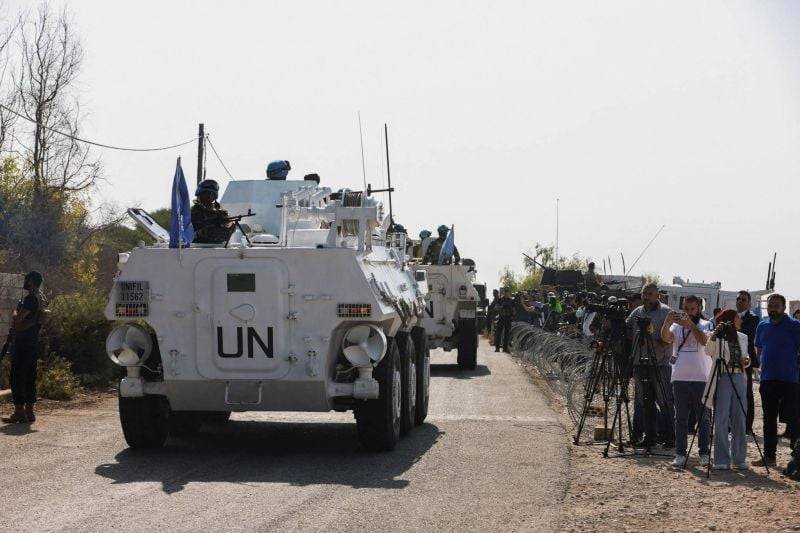
Journalists gathered at the passage of tanks of the United Nations Interim Force in Lebanon in the border town Naqoura on Thursday ahead of the signing of the agreement with Israel. (Credit: Aziz Taher/Reuters)
“This is a historic day,” said US envoy Amos Hochstein on Thursday while at Baabda Palace, enthusing about the maritime border demarcation agreement he brokered and that Lebanon and Israel finalized.
The deal, which was negotiated over several years and signed Thursday, is said to serve the interest of both sides, as well as those of the local actors who were involved in the talks. L’Orient-Le Jour offers an overview of the main beneficiaries of the deal.
Lebanon
Is it a good deal for Lebanon? The question is open to debate among specialists. On the one hand, Lebanon has given up its claim for Line 29, which could have allowed it to claim an additional 1,430 square kilometers and part of the hydrocarbons-rich Karish field. On the other hand, the deal granted Lebanon the whole area it has claimed, which is officially delimited by Line 23, and all the exploitation rights in the Qana field, which remains unexplored.
From an economic point of view, there is no guarantee that the field will generate the windfall the Lebanese ruling class promised its citizens. Firstly, this is because it will take several years for any potential discovery — should there be one — to become lucrative.
Secondly, this is because according to most optimistic estimates, Lebanon could count on revenues ranging between $6 and $8 billion at best, delivered over a period of 15 years.
Thirdly, this is because part of the potential profits from the exploitation of the Qana field have to be paid, via TotalEnergies, to Israel, since part of the field is located in its exclusive economic zone.
On the diplomatic and geopolitical level, however, Lebanon came out of the agreement stronger. After the signing, Beirut appears a more reliable actor on the international scene. US President Joe Biden welcomed the imminent signing of the agreement Wednesday, saying it took “guts” on the part of both countries to get it done. Similarly, Paris has repeatedly welcomed the finalization of the text.
These remarks are not trivial at a time when Lebanon urgently needs international aid to get itself out of its now yearslong financial crisis. Last but not least, by creating a common economic interest between Lebanon (including Hezbollah) and Israel, the agreement pushes away any prospects of a new war between the two neighbors and should result in greater stability at the southern border.
Israel
For Tel Aviv, the agreement is also perceived as a victory. Even if the country has formally given in to the official Lebanese claim (Line 23) and allowed Lebanon to exploit the entire Qana field, it will obtain financial compensations in return, should gas be found in the plot.
Moreover, pending an agreement on the land border, the buoy line, which is considered a security-related issue for Israel, marks the border between the two countries, extending for six kilometers before joining Line 23.
Most importantly, Israel will be able to embark on gas extraction from the Karish field and to market that gas without any concerns over Hezbollah’s threats. The latter had repeatedly threatened to attack Israeli facilities if Lebanon’s southern neighbor extracted gas from this field before resolving the dispute with Lebanon.
Against the backdrop of Russia’s war against Ukraine, and as the West is looking for gas supply sources to reduce its dependence on Russian gas, Israel hopes to make significant economic gains from the agreement.
Tel Aviv would also benefit from the stability-related promise on its northern border, as the country has been going through an intense political crisis for several years, forcing it to hold new elections every few months.
The agreement reached ahead of the next Israeli legislative elections could be beneficial to its centrist Prime Minister Yair Lapid. This is because despite the harsh criticism leveled by the Israeli right, led by former Prime Minister Benjamin Netanyahu, who accused the government of having yielded to Hezbollah’s threats, opinion polls show that a large percentage of Israelis are in favor of the agreement.
Michel Aoun
On the Lebanese scene, President Michel Aoun is the big winner. Hehas taken the file in hand since 2020 and sought to finalize an agreement at all costs, in order to save his term in office, which has been marked by multiple crises. The text was mainly negotiated by his close associates, led by Deputy Parliament Speaker Elias Bou Saab.
The president also managed to strip his main opponents of this victory, most significantly Parliament Speaker Nabih Berri, who sponsored the framework agreement that put the file on track.
The president pulled the rug out from under the Lebanese Army as well, which was in charge of the negotiations until December 2020, when they were suspended due to disagreements between the two countries. Back then, the Lebanese Army was holding fast to Line 29, which it deemed part of Lebanon’s rights.
It was based on this imperative that the amendment to Presidential Decree No. 6433 was drafted, to rectify the map Lebanon transmitted to the UN in 2011. Yet, this decree had stalled on Aoun’s desk.
By stripping the commander-in-chief of the army, Gen. Joseph Aoun, of this success, Aoun ensured that the army chief could not exploit this political capital to the advantage of his potential ambitions for presidency. The army chief is indeed perceived as a serious candidate for president, to the dismay of the president’s son-in-law, Gebran Bassil, who describes himself as a “logical candidate” for the position.
Does Hezbollah come out of the agreement stronger or not? Here too, the question is open to debate. On the one hand, Hezbollah is counting on the exploitation of offshore gas in order for Lebanon to get out of the economic crisis that has heavily impacted the Shiite community and increased polarization on its arsenal in the country.
A large portion of the opposition blame Hezbollah, and its arsenal, for Lebanon’s isolation on the international scene and for blocking any aid that might pull the country out of the crisis.
Hezbollah also presents the agreement as a strategic victory, since it claimed that its threats to resort to military escalation have brought the Jewish state to heel. However, the agreement is tantamount to an embarrassment for Hezbollah, because many perceive it as a form of recognition of the state of Israel. Lapid said Thursday that the deal signifies de facto “recognition” of Israel by Lebanon.
Hezbollah’s Secretary-General Hassan Nasrallah was quick to reply, saying that the deal “is not an international agreement and does not mean Lebanon has recognized Israel [as a state].”
Even though it stands behind the Lebanese state, Hezbollah has given its green light to this agreement. This may strengthen its influence in Lebanon and improve its relations with the West. But at the same time, the Iran-backed party has lost some of its credibility as a “resistance” force to Israel.
This article was originally published in French in L'Orient-Le Jour. Translations by Joelle El Khoury.
